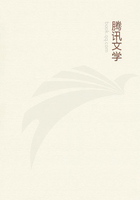Plutarch is philosophic enough to see that in the sense of a violation of the laws of nature a miracle is impossible. It is absurd, he says, to imagine that the statue of a saint can speak, and that an inanimate object not possessing the vocal organs should be able to utter an articulate sound. Upon the other hand, he protests against science imagining that, by explaining the natural causes of things, it has explained away their transcendental meaning. 'When the tears on the cheek of some holy statue have been analysed into the moisture which certain temperatures produce on wood and marble, it yet by no means follows that they were not a sign of grief and mourning set there by God Himself.' When Lampon saw in the prodigy of the one-horned ram the omen of the supreme rule of Pericles, and when Anaxagoras showed that the abnormal development was the rational resultant of the peculiar formation of the skull, the dreamer and the man of science were both right; it was the business of the latter to consider how the prodigy came about, of the former to show why it was so formed and what it so portended. The progression of thought is exemplified in all particulars. Herodotus had a glimmering sense of the impossibility of a violation of nature. Thucydides ignored the supernatural.
Polybius rationalised it. Plutarch raises it to its mystical heights again, though he bases it on law. In a word, Plutarch felt that while science brings the supernatural down to the natural, yet ultimately all that is natural is really supernatural. To him, as to many of our own day, religion was that transcendental attitude of the mind which, contemplating a world resting on inviolable law, is yet comforted and seeks to worship God not in the violation but in the fulfilment of nature.
It may seem paradoxical to quote in connection with the priest of Chaeronea such a pure rationalist as Mr. Herbert Spencer; yet when we read as the last message of modern science that 'when the equation of life has been reduced to its lowest terms the symbols are symbols still,' mere signs, that is, of that unknown reality which underlies all matter and all spirit, we may feel how over the wide strait of centuries thought calls to thought and how Plutarch has a higher position than is usually claimed for him in the progress of the Greek intellect.
And, indeed, it seems that not merely the importance of Plutarch himself but also that of the land of his birth in the evolution of Greek civilisation has been passed over by modern critics. To us, indeed, the bare rock to which the Parthenon serves as a crown, and which lies between Colonus and Attica's violet hills, will always be the holiest spot in the land of Greece: and Delphi will come next, and then the meadows of Eurotas where that noble people lived who represented in Hellenic thought the reaction of the law of duty against the law of beauty, the opposition of conduct to culture.
Yet, as one stands on the [Greek text which cannot be reproduced] of Cithaeron and looks out on the great double plain of Boeotia, the enormous importance of the division of Hellas comes to one's mind with great force. To the north are Orchomenus and the Minyan treasure-house, seat of those merchant princes of Phoenicia who brought to Greece the knowledge of letters and the art of working in gold. Thebes is at our feet with the gloom of the terrible legends of Greek tragedy still lingering about it, the birthplace of Pindar, the nurse of Epaminondas and the Sacred Band.
And from out of the plain where 'Mars loved to dance,' rises the Muses' haunt, Helicon, by whose silver streams Corinna and Hesiod sang; while far away under the white aegis of those snow-capped mountains lies Chaeronea and the Lion plain where with vain chivalry the Greeks strove to check Macedon first and afterwards Rome; Chaeronea, where in the Martinmas summer of Greek civilisation Plutarch rose from the drear waste of a dying religion as the aftermath rises when the mowers think they have left the field bare.
Greek philosophy began and ended in scepticism: the first and the last word of Greek history was Faith.
Splendid thus in its death, like winter sunsets, the Greek religion passed away into the horror of night. For the Cimmerian darkness was at hand, and when the schools of Athens were closed and the statue of Athena broken, the Greek spirit passed from the gods and the history of its own land to the subtleties of defining the doctrine of the Trinity and the mystical attempts to bring Plato into harmony with Christ and to reconcile Gethsemane and the Sermon on the Mount with the Athenian prison and the discussion in the woods of Colonus. The Greek spirit slept for wellnigh a thousand years. When it woke again, like Antaeus it had gathered strength from the earth where it lay; like Apollo it had lost none of its divinity through its long servitude.
In the history of Roman thought we nowhere find any of those characteristics of the Greek Illumination which I have pointed out are the necessary concomitants of the rise of historical criticism.
The conservative respect for tradition which made the Roman people delight in the ritual and formulas of law, and is as apparent in their politics as in their religion, was fatal to any rise of that spirit of revolt against authority the importance of which, as a factor in intellectual progress, we have already seen.
The whitened tables of the Pontifices preserved carefully the records of the eclipses and other atmospherical phenomena, and what we call the art of verifying dates was known to them at an early time; but there was no spontaneous rise of physical science to suggest by its analogies of law and order a new method of research, nor any natural springing up of the questioning spirit of philosophy with its unification of all phenomena and all knowledge.















